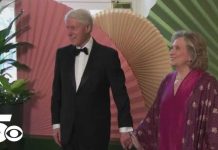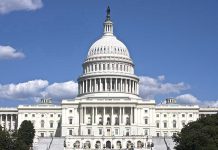
Hillary Clinton’s unexpected praise for Donald Trump’s stance on Russia has created a rare moment of bipartisan agreement and could redefine U.S. foreign policy dynamics.
Story Highlights
- Clinton praises Trump’s potential diplomatic move on Russia.
- Putin is seen as responsive only to strong opposition.
- Clinton and Trump, historical rivals, momentarily align on foreign policy.
- The focus remains on ending the Ukraine war without concessions.
Clinton’s Surprising Endorsement
In an unexpected twist, Hillary Clinton has publicly praised Donald Trump for his abrupt shift in dealing with Russia. Speaking on the “Raging Moderates” podcast, Clinton stated that if Trump manages to end Russia’s war in Ukraine without Ukraine having to concede territory, she would nominate him for the Nobel Peace Prize. This comment underscores her belief that Putin only responds to strength, a notion that reflects a significant departure from her usual criticism of Trump.
Clinton’s comments come at a time when U.S.-Russia relations are particularly tense. Her willingness to acknowledge the potential effectiveness of Trump’s approach marks a unique moment of bipartisan consensus on the need for a strong U.S. stance against Putin’s aggression. This alignment, albeit temporary, could influence U.S. foreign policy and reshape the discourse around the ongoing conflict in Ukraine.
The Historical Context
The U.S. and Russia have had a strained relationship since the Cold War, with tensions escalating further following Russia’s annexation of Crimea in 2014 and its full-scale invasion of Ukraine in 2022. Clinton and Trump have a long-standing history of political rivalry, dating back to the 2016 presidential election. Despite their differences, both leaders now seem to agree on the necessity of a strong response to Russian aggression, echoing the sentiment that Putin tests Western resolve and only responds to unified opposition.
This development comes amid the Biden administration’s efforts to rebuild alliances and support Ukraine, contrasting with Trump’s more transactional approach to foreign policy. The ongoing debates in the U.S. about the best strategy to counter Russian threats highlight the complexities of balancing diplomatic engagement with a firm stance.
The Impact on Key Stakeholders
Clinton’s praise puts pressure on Trump to maintain a tough stance with Putin, potentially influencing both U.S. policy and public expectations. The Ukrainian government, led by President Volodymyr Zelenskyy, remains adamant about not conceding any territory to Russia, a stance that aligns with Clinton’s conditions for praising Trump. The U.S. State Department, under Antony Blinken, continues to support Ukraine’s sovereignty and democratic values.
Trump’s engagement with Putin and the subsequent media coverage have sparked discussions about potential diplomatic breakthroughs and the implications for U.S.-Russia relations. Clinton’s remarks also introduce a new dynamic in U.S. political discourse, momentarily bridging partisan divides on foreign policy.
Long-term Implications
If Trump successfully brokers a peace deal without compromising Ukraine’s territorial integrity, it could significantly reshape his legacy and the broader U.S.-Russia relationship. Such a development would also have profound implications for NATO and European allies, who closely monitor U.S. resolve and any potential shifts in support.
Economically, continued instability in Ukraine affects global markets, particularly in energy and grain sectors. Socially, war fatigue and humanitarian concerns persist, while politically, Clinton’s remarks may encourage a more unified approach to foreign policy among U.S. leaders, at least temporarily.


















